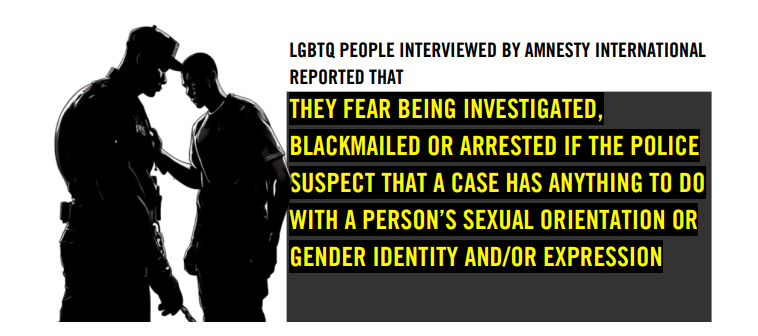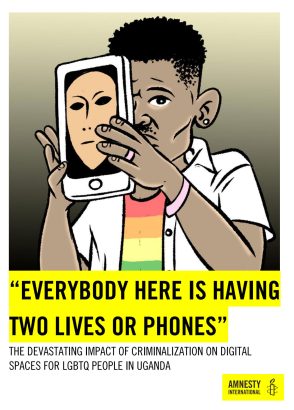Report: Online attacks increase against LGBTQ Ugandans
Joto La Jiwe is a Ugandan correspondent for the African…
Ugandan authorities encourage abuse of LGBTQ people, report alleges

Online harassment against the LGBTQI+ community in Uganda has increased sharply, according to a new report from Amnesty International.
The report, “Everybody Here Is Having Two Lives and Phones: The Devastating Impact of Criminalization on Digital Spaces for LGBTQ People in Uganda,” follows a study conducted by Amnesty International between June 2023 and February 2024 in and around six cities in Uganda, focusing on the impact that technology-facilitated gender-based violence (GBV) has on LGBTQ Ugandans.
The report documents cases of doxing, outing, threats of violence, blackmail, impersonation, hacking and disinformation against LGBTQ people.
The report finds that the Anti-Homosexuality Act (AHA) 2023 fostered a climate of impunity for attacks against LGBTQ people, forcing both individuals and organizations to significantly alter how they present themselves and engage with people online.
“To tell you the truth, before the law (Anti-Homosexuality Act, 2023), we used to be out there discussing everything. But when it came to pass, some of us, it’s like we went back to the closet,” an LGBTQ activist from Eastern Uganda says in the report.

According to the report, some LGBTQ persons and organizations have had to shut down their social media accounts due to threats and harassment.
“Mostly before [the AHA 2023 passed], I was this visible person, very visible. So, if I see on social media, like if there’s a community thing and there’s a debate or discussion going on, I would gladly like to involve myself. I can’t do that now. So, because like I’ve unfollowed most of those accounts where we used to have those debates and stuff, so now I don’t know what is going on. So I’m now limited. I can’t share some stuff because you don’t know who’s going to find it,” a gay rights activist says in the report.
The harms of technology-facilitated GBV are not confined to digital spaces alone. The online-offline continuum of gender-based violence means that threats online can often translate into offline consequences, including physical violence for those who are publicly active in advocating for LGBTQ rights in online spaces.
Gay rights activist Steven Kabuye was stabbed after using social media to advocate for LGBTQ rights through his X (formerly Twitter) account @Truthlgbtq.
“[Technology-facilitated] GBV has devastating consequences for LGBTQ people, as online targeting can result in offline consequences, including arbitrary arrests, torture and other ill-treatment, forced evictions, dismissal from work, exposure to offline violence, as well as stress, anxiety, and depression,” says Shreshtha Das, Amnesty International’s Gender Researcher/Advisor.
The regime as an accomplice
According to the Amnesty International report, the government’s complicity in the abuse of LGBTQ people goes beyond passing the Anti-Homosexuality Act. The report highlights the failure of the Ugandan authorities to prevent or address these abuses, and also their active role in encouraging and condoning them, exposing LGBTQ people to grave human rights abuses.
“Instead of adopting policies to combat [technology-facilitated] GBV, the Ugandan authorities have clamped down on human rights defenders and organizations, placing discriminatory restrictions on their work,” says Marco Perolini, Amnesty International’s Civic Space Policy Advisor.
There are several laws contributing to limiting online space in Uganda, including the Computer Misuse Act, the Regulation of Interception of Communications Act, Uganda Communications Act, and the Electronic Transactions Act. The report says that that the Computer Misuse Act is one of the primary laws used by Ugandan authorities to control online expression and further criminalize LGBTQ people.




